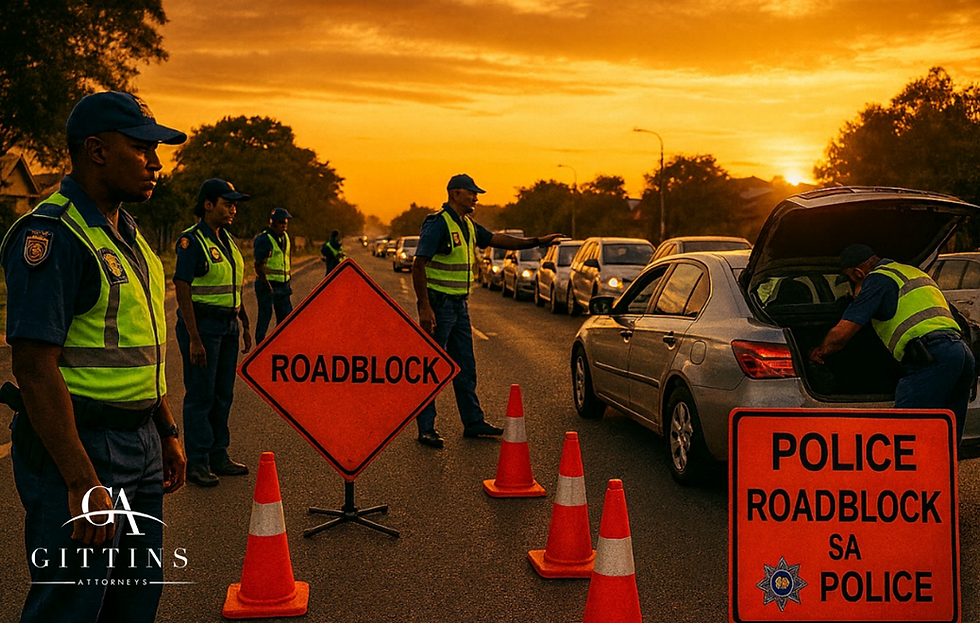The Rise of Virtual Commissioning in South Africa: Navigating Legal Challenges and Technological Solutions
- Gittins Attorneys Law Firm

- Oct 29, 2024
- 3 min read

In South Africa, commissioning oaths has traditionally been a physical, face-to-face process governed by the Justices of the Peace and Commissioners of Oaths Act and its accompanying Regulations. Commissioners of oaths are required to verify the identity of the deponent, certify the authenticity of attached documents, and oversee the administration of the oath. This process has been central to ensuring the integrity and credibility of sworn statements submitted to courts and public bodies. However, with the surge of COVID-19 and resulting lockdowns, the legal landscape faced an unprecedented dilemma how to maintain the sanctity of oath-taking when physical presence was not feasible. Consequently, virtual commissioning emerged as a potential solution, albeit with its own set of challenges and limitations.
Case Law and Precedents Supporting Virtual Commissioning
Several rulings have set precedents for the conditional acceptance of virtual commissioning. In the landmark case of S v Munn, the court clarified that the physical presence requirement in the Act is directory, rather than mandator*. The court held that substantial compliance could meet the Act’s objectives if non-compliance did not compromise the reliability of the affidavit. This decision laid the groundwork for recent cases to argue that remote commissioning, when done responsibly, does not invalidate an affidavit.
Additionally, a 2017 judgment by Judge Satchwell authorized video-link testimonies from witnesses located abroad, further demonstrating the courts’ openness to using technology for legal proceedings. The willingness to incorporate these technological tools reflects an evolving judicial attitude towards balancing procedural formalities with practical realities.
Practical Guidelines for Virtual Commissioning
While courts have shown flexibility, virtual commissioning must be conducted meticulously to ensure compliance with legal standards. To bolster the legitimacy of a virtually commissioned affidavit, certain best practices have emerged:
1. Identity Verification: The commissioner of oaths must confirm the deponent’s identity through video, ensuring that the person swearing the affidavit is indeed who they claim to be.
2. Oath Administration: The commissioner should administer the oath or affirmation verbally over the video call, mirroring the traditional oath-taking process.
3. Recording the Process: Whenever possible, recording the video call can provide a clear record of compliance, documenting that the oath was administered and the deponent’s identity verified.
4. Detailed Explanation by Legal Practitioners: When virtual commissioning is necessary, a legal practitioner may depose to a separate affidavit explaining the steps taken to comply with the Act’s requirements.
5. Documenting Health Circumstances: For deponents affected by illness, attaching medical documentation can provide further context for the need for virtual commissioning.
These steps, endorsed in several South African cases, help ensure that the affidavit’s authenticity is maintained, even if the commissioning does not strictly adhere to physical presence requirements.
Technological and Legislative Future of Virtual Commissioning
The Electronic Communications and Transactions Act (ECTA), enacted in 2002, provides for the use of electronic signatures and recognizes the legal validity of digital communications. However, it does not directly address the requirements for oath-taking under the Act. While ECTA supports the legality of digital documents, it stops short of endorsing virtual commissioning for affidavits, a gap that has become increasingly apparent as the need for remote legal processes grows.
Updating the Justices of the Peace and Commissioners of Oaths Act to incorporate virtual commissioning explicitly would allow South African courts to streamline procedures and provide clear guidelines for digital oath-taking. For now, the courts have adapted through case-by-case determinations, yet a formal amendment to the Act could standardize virtual commissioning, removing uncertainty for legal practitioners and deponents alike.
Safeguarding Against Fraud and Risks
One of the primary concerns with virtual commissioning is the potential for fraud or document tampering. Without physical presence, verifying the authenticity of the deponent and the integrity of the affidavit can be more challenging. To mitigate these risks, commissioners of oaths and legal practitioners must employ secure, reliable digital platforms for virtual commissioning. Additionally, biometric verification or other advanced technologies could provide enhanced security measures, ensuring that only authorized individuals participate in the virtual oath-taking process.
Conclusion: A Flexible, Technologically-Enhanced Future
The shift towards virtual commissioning marks a progressive step for South Africa’s legal system, aligning with broader digital transformations occurring worldwide. While the courts have signaled that they are prepared to accept virtual commissioning under specific circumstances, the legal framework still lags behind technological advances. Updating South Africa’s oath-taking legislation to reflect current needs will provide clarity, ensure consistency, and promote access to justice.
As we move into an increasingly digital era, South Africa’s legal system will need to continue balancing procedural integrity with flexibility. Virtual commissioning has demonstrated that with thoughtful implementation and careful oversight, the goals of the Act—ensuring reliable, verified sworn statements—can be met, even in a virtual format.



Comments